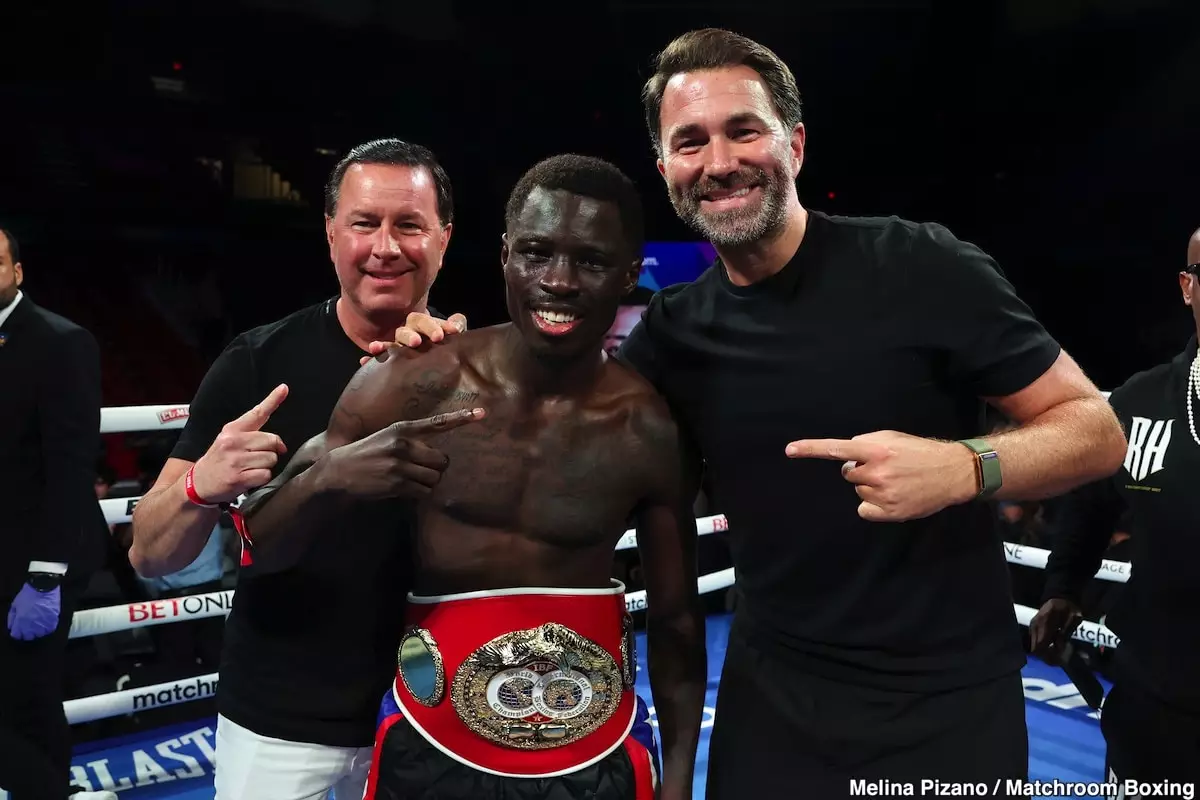In the often murky waters of modern boxing, where bravado and self-promotion reign supreme, IBF light welterweight champion Richardson Hitchins finds himself at a crossroads. Having racked up an undefeated record of 19 wins with 7 KOs, he stands poised for a title defense against George Kambosos Jr. on June 14th. Yet, rather than focusing on this impending bout, Hitchins seems more consumed with crafting a narrative around dream matchups with boxing heavyweights like Devin Haney, Teofimo Lopez, and Ryan Garcia. This tactic raises a paramount question: Is Hitchins genuinely interested in fighting top-tier competition, or is he merely chasing clout to mask a potentially uninspiring title defense?
While many champions focus on their forthcoming challenges, Hitchins has opted to generate buzz by calling out fighters who have previously made names for themselves while he is still working to secure his footing in the sport. His insistence that he can rekindle the excitement surrounding boxing in New York by claiming, “we want to hurt each other,” fails to resonate when the reality of his opponent presents a stark contrast. Kambosos, once a formidable presence in the ring, has become a faded shadow, boasting a disappointing 2-3 record in his last five outings, indicating that he has not been able to sustain the momentum after his notable win over Lopez.
Clout-Chasing: The Modern Boxer’s Dilemma
In an era where social media dominates the dialogue, clout-chasing has become a common phenomenon among fighters. Hitchins’ aspiration to bring excitement back to Madison Square Garden is laudable, yet his choice to spotlight Kambosos—a fighter seen by many as past his prime—invites skepticism. Hitchins might argue that the animosity between him and Kambosos fuels interest, but true boxing aficionados recognize that this rivalry lacks the intrinsic stakes that define memorable matchups. Tackling a faded opponent likely serves only to inflate Hitchins’ ego rather than solidify his reputation.
Boxing, at its core, should be about facing challenges that push fighters to their limits, not about orchestrating carefully curated bouts that prioritize hype over skill. Fans have expressed their disdain; they expect a champion to rise to the occasion rather than pick low-hanging fruit. The clamor for a showdown with contenders like Subriel Matias and Gary Antuanne Russell highlights that fans are yearning for authenticity. Hitchins’ failure to seize these opportunities presents a disheartening image—a champion lingering in the safety of less challenging fights, all while his peers engage with their own escalating narratives.
Kambosos: A Distant Reflection of What’s at Stake
Richardson Hitchins’ upcoming challenge against Kambosos is reflective of broader trends troubling the sport—an uncomfortable gap between talking big and acting decisively. While Hitchins has boldly declared that he feels fighters are “terrified” of him, his insistence on facing a fighter in Kambosos who has struggled to regain his footing reveals more insecurity than confidence. As fans consider who will emerge victorious, they also ponder why Hitchins didn’t pursue more challenging rivals who could enhance his standing and bolster his legacy.
Contrarily, Kambosos finds himself in desperate circumstances. Coming off subpar performances, he is clinging to the last shred of significance in his career, attempting to reclaim relevance through this fight. It stands to reason that with Hitchins choosing this specific matchup, they are both playing a dangerous game—one where the specter of embarrassment looms larger than the promise of accolades.
The Mirage of Dream Fights
One cannot ignore the fantasy aspect of boxing—where dream matchups light up the imagination and discussions among fans. However, these fantasies become a double-edged sword when they distract promising boxers from the reality of climbing the ranks through tangible skill and grit in the ring. Hitchins’ dreams of fighting the likes of Haney, Lopez, or Garcia are not inherently misplaced, but they float dangerously close to the realm of delusion when set against the backdrop of his current career trajectory.
The perception is that Hitchins is meticulously crafting a “cash-out” strategy—treading gently through fights to ensure his monetary future rather than fighting for honor in the ring. Declaring an ambitious intention to unify titles or take on any champion sounds bold on paper, but until those words translate into actions, they merely serve as noise in an industry rife with disillusionment.
Hitchins boasts of fights at any cost, claiming he could take on Lopez and Kambosos in the same night for less than a million, but these words often serve as an illusion meant to prop up a shaky foundation. If anything, they reveal a chasm between what levels of competition Hitchins aspires to and what he is willing to confront. True greatness in boxing is rarely a product of calling out bigger names—it is earned by stepping into the ring and backing those claims with decisive action. Until Hitchins steps decisively into meaningful matchups, his declarations will remain little more than hollow echoes in the unforgiving landscape of boxing.

